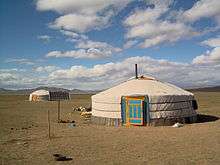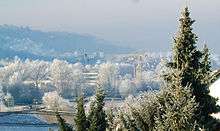Definify.com
Definition 2026
Ger
ger
ger
English

Noun
ger (plural gers)
- A yurt.
- 2007, Michael Chabon, Gentlemen of the Road, Sceptre 2008, p. 133:
- The new bek's great-grandfather had passed every night of his life under the sky, on the back of a pony or in the felt walls of a ger, and Buljan retained the ancestral contempt for cities and city dwellers.
- 2007, Michael Chabon, Gentlemen of the Road, Sceptre 2008, p. 133:
Translations
Etymology 2
Borrowing from Hebrew גֵּר (ger).
Noun
ger (plural gerim)
- A male convert to Judaism.
Anagrams
Albanian
Etymology
From Proto-Albanian *gaura. Compare Lithuanian gauras (“hair, down, tuft of hair”), Latvian gauri (“pubic hair”) and Middle Irish gúaire (“hair”).
Noun
ger m
- squirrel (furry)
Related terms
Breton
Etymology
From Proto-Brythonic *gėr, from Proto-Celtic *garyo- (“word, speech”), from Proto-Indo-European *ǵh₂r-, zero grade of *ǵeh₂r-.
Cognate with Ancient Greek γῆρυς (gêrus, “voice, speech”), Khotanese [script needed] (ysār-, “to sing”), Latin garriō (“chatter”), Old English ċearu (“sorrow”).
Pronunciation
- IPA(key): /ˈɡeːʁ/
Noun
ger m
- word
- 1990, Thomas Arwyn Watkins, Martin John Ball, Celtic Linguistics / Ieithyddiaeth Geltaidd: Readings in the Brythonic Languages. p. 202.
- Skrijal a rae Loeiz o tistagan ar ger [...] 'Louis screamed in pronouncing the word'.
- 1990, Thomas Arwyn Watkins, Martin John Ball, Celtic Linguistics / Ieithyddiaeth Geltaidd: Readings in the Brythonic Languages. p. 202.
Derived terms
- geriadur ("dictionary")
Cornish
Etymology
From Proto-Brythonic *gėr, from Proto-Celtic *garyo- (“word, speech”), from Proto-Indo-European *ǵh₂r-, zero grade of *ǵeh₂r-.
Cognate with Ancient Greek γῆρυς (gêrus, “voice, speech”), Khotanese [script needed] (ysār-, “to sing”), Latin garriō (“chatter”), Old English ċearu (“sorrow”).
Pronunciation
Noun
ger m (plural geryow)
Derived terms
Mutation
Faroese
Pronunciation
Etymology 1
Verb
ger
- 3rd person singular present of gera
- imperative singular of gera
Conjugation
| v-31 | ||||
| infinitive | gera | |||
|---|---|---|---|---|
| present participle | gerandi | |||
| past participle a7 | gjørdur | |||
| supine | gjørt | |||
| number | singular | plural | ||
| person | first | second | third | all |
| indicative | eg | tú | hann/hon/tað | vit, tit, teir/tær/tey, tygum |
| present | geri | gert | ger | gera |
| past | gjørdi | gjørdi | gjørdi | gjørdu |
| imperative | – | tú | – | tit |
| present | — | ger! | — | gerið! |
Etymology 2
From Old Norse [Term?].
Noun
ger f (genitive singular gerar, uncountable)
Declension
| Declension of ger (singular only) | ||
|---|---|---|
| f2s | singular | |
| indefinite | definite | |
| nominative | ger | gerin |
| accusative | ger | gerina |
| dative | ger | gerini |
| genitive | gerar | gerarinnar |
Icelandic
Pronunciation
- IPA(key): /cɛːr/
- Rhymes: -ɛːr
Etymology 1
Borrowing from Danish gær, from Old Norse gerð, from Proto-Germanic *garwidō.
Noun
ger n (genitive singular gers, no plural)
Declension
Synonyms
- (yeast): jöstur
Etymology 2
From Old Norse gør, from Proto-Germanic *garwiją or *gerwą.
Noun
ger n (genitive singular gers, no plural)
Declension
Etymology 3
From Old Norse gerr, gjǫrr, gǫrr, from Proto-Germanic *garwaz.
Adjective
ger (not comparable)
- ready, fully prepared
Inflection
Etymology 4
From Old Norse gerr, cognate with Old High German ger (“greedy”).
Adjective
ger (comparative gerari, superlative gerastur)
Inflection
| singular | masculine | feminine | neuter |
|---|---|---|---|
| nominative | gerari | gerari | gerara |
| accusative | gerari | gerari | gerara |
| dative | gerari | gerari | gerara |
| genitive | gerari | gerari | gerara |
| plural | masculine | feminine | neuter |
| nominative | gerari | gerari | gerari |
| accusative | gerari | gerari | gerari |
| dative | gerari | gerari | gerari |
| genitive | gerari | gerari | gerari |
| singular | masculine | feminine | neuter |
|---|---|---|---|
| nominative | gerastur | gerust | gerast |
| accusative | gerastan | gerasta | gerast |
| dative | gerustum | gerastri | gerustu |
| genitive | gerasts | gerastrar | gerasts |
| plural | masculine | feminine | neuter |
| nominative | gerastir | gerastar | gerust |
| accusative | gerasta | gerastar | gerust |
| dative | gerustum | gerustum | gerustum |
| genitive | gerastra | gerastra | gerastra |
| singular | masculine | feminine | neuter |
|---|---|---|---|
| nominative | gerasti | gerasta | gerasta |
| accusative | gerasta | gerustu | gerasta |
| dative | gerasta | gerustu | gerasta |
| genitive | gerasta | gerustu | gerasta |
| plural | masculine | feminine | neuter |
| nominative | gerustu | gerustu | gerustu |
| accusative | gerustu | gerustu | gerustu |
| dative | gerustu | gerustu | gerustu |
| genitive | gerustu | gerustu | gerustu |
Etymology 5
From Old Norse gerr, gjǫrr, gørr, from Proto-Germanic *garwiz, comparative of the adverb corresponding to ger (3).
Adverb
ger (comparative form; superlative gerst)
- better, more thoroughly
References
- Ásgeir Blöndal Magnússon — Íslensk orðsifjabók, 1st edition, 2nd printing (1989). Reykjavík, Orðabók Háskólans.
Old Saxon
Etymology
Variant of jār.
Noun
ger n
Declension
| Singular | Plural | |
|---|---|---|
| nominative | gēr | gēr |
| accusative | gēr | gēr |
| genitive | gēres | gērō |
| dative | gēre | gērum |
| instrumental | — | — |
Romanian

Etymology
From Latin gelū, from Proto-Indo-European *gel- (“cold”).
Noun
ger n (plural geruri)
- frost (cold weather that causes frost to form)
- frigidness, frosty weather
Derived terms
See also
Swedish
Pronunciation
- IPA(key): /jeːr/
Verb
ger